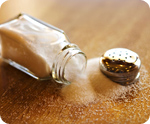
Myth busted: No-salt diets are NOT necessarily healthier
Saturday, August 25, 2012 by: J. D. Heyes
Tags: salt, diet myths, hypertension
- Criminal referral requests filed against Fauci and top COVID officials in seven states
- Aluminum, essential to vaccine science, also causes serious health conditions, including chronic fatigue, neurodegenerative diseases, macrophagic myofasciitis
- DOGE unveils $400M unemployment fraud scandal: Toddlers, futuristic birthdates fuel outcry
- Gardening tips: 15 Simple tricks to double your garden’s yield this season
- Oats: A nutritional powerhouse for health and wellness
- TAKE IT DOWN Act advances in Congress amid free speech concerns
- Survival 101: Dangerous places to avoid when disaster strikes
- A turning point in American economic history: “The Origins of the Federal Reserve” by Murray N. Rothbard
- Nature’s arsenal: How plant compounds power military survival and healthcare in crisis
- Kawasaki unveils rideable ROBOT HORSE powered by hydrogen
- Amazon's Kuiper satellite launch delay highlights uphill battle against Musk's Starlink
- DOJ and ATF kill Biden’s “Zero Tolerance” firearms dealer policy
- U.S.-funded "anti-misinformation" groups persist, raising concerns over censorship and bias
- Tesla halts U.S.-made Model S and X orders in China amid escalating trade war
- Trump to impose major tariffs on foreign-made pharmaceuticals
- “Prepare Tribe: Prepare, Protect, Provide” on BrightU: How to build a disaster-proof shelter in the middle of nowhere
- “Prepare Tribe: Prepare, Protect, Provide” on BrightU: Protecting heirloom crops from corporate extinction
- Barley: A nutrient-dense ancient grain with modern benefits
- Tulsi Gabbard leads charge against the Biden regime’s global censorship of the 'Disinformation Dozen'
- Fauci is back in the limelight, and he’s busy promoting a future COVID or FLU pandemic
- Aerosolized bioweapons? Strange “diploid biomasses” falling out of the sky in Florida captured under the microscope
- Analysis: The coming economic collapse, a mass uprising and Trump's three secret weapons to halt the growing revolt
- Widespread social and economic unrest: Steve Quayle issues urgent financial warning of imminent asset collapse in new interview with Mike Adams
- Kiss Your Genetic Privacy Good-Bye! 23andMe Gets Green Light to Sell Your Intimate Genetic Details to Anyone They Want
- Tulsi Gabbard takes aim at censorship: Justice for the ‘Disinformation Dozen’
- Mike Adams releases country western hit single: Goin’ Back in Time is Comin’ Home
- U.S. lawmakers investigate Meta over alleged China collaboration
- CLOT SHOT PLANDEMIC UNFOLDING: Fibrous, rubbery clots caused by covid injections have prion-like seeding activity
- Chemtrails unveiled: How the CIA and Big Business are manipulating the weather for profit
- How Israeli military-connected corporations are secretly controlling your online privacy
- European Court of Justice: Healthcare professionals who promoted or administered COVID-19 vaccines are CRIMINALLY LIABLE for any harm caused
- DEATH by VACCINE or face PRISON time: Canadian Freedom Convoy leaders CONVICTED for protesting forced vaccination during the Covid Plandemic
- Defunding DEADLY mRNA jabs: Government funding for mRNA technology being scrutinized and sidelined until proven "safe and effective" for real
- Federal employees whine over DOGE's new directive requiring them to do a 5-point summary of weekly accomplishments
- U.S. approves new Russian ambassador as diplomatic thaw continues
- Curcumin’s ancient healing power supercharges muscle recovery, and its effects are compounded with anti-inflammatory foods and supplements
- Newly released JFK files reveal Pentagon's role in creating Lyme disease and covid in the same lab
- Analysis: The coming economic collapse, a mass uprising and Trump's three secret weapons to halt the growing revolt
- Mike Adams releases country western hit single: Goin’ Back in Time is Comin’ Home
- Aerosolized bioweapons? Strange “diploid biomasses” falling out of the sky in Florida captured under the microscope
- Kiss Your Genetic Privacy Good-Bye! 23andMe Gets Green Light to Sell Your Intimate Genetic Details to Anyone They Want
- Dr. Mike Yeadon releases 15-minute testimony - WATCH - about genocidal intent of COVID “vaccines”
- Trump reverses course on Gaza plan, says “nobody is expelling Palestinians”
- MEDICAL BOMBSHELL: FDA admits Covid mRNA 'Vaccines' CAUSE CANCER
- European Court of Justice: Healthcare professionals who promoted or administered COVID-19 vaccines are CRIMINALLY LIABLE for any harm caused
- The Health Ranger releases “Vaccine Zombie” song and music video, using AI-animated zombies for the music video
- 5 Simple steps to boost your brainpower: How to strengthen executive function in a distracted world
- A lack of integrity in Academia: Harvard professor found GUILTY of fraudulent research to promote CRT theory
- Federal employees whine over DOGE's new directive requiring them to do a 5-point summary of weekly accomplishments
- EPA advisor admits the agency is funneling billions to climate groups ahead of Trump’s return to White House
- California's social media censorship law struck down: A victory for free speech or a threat to online safety?
- Space war brewing? Russia threatens to destroy Starlink satellites
- Survival 101: Effective EMF blocking techniques
- Rep. Nancy Mace introduces bill to ban biological males from female facilities on federal property
- Red Cross issues warning to stop blood plasma donations from vaccinated people
- Scientists confirm: GENIUS brain function can be spontaneously unleashed in humans without any apparent cause
- EPA advisor admits the agency is funneling billions to climate groups ahead of Trump’s return to White House
- HYSSOP: What research reveals about the health benefits of this ancient holy herb
- Two containers with completed ballots fall out of truck in Florida
- Newly released JFK files reveal Pentagon's role in creating Lyme disease and covid in the same lab
- Global leaders unite to clamp down on “misinformation” with UN-backed Cascais Declaration
- BREAKING: 2025 NDAA authorizes mandatory military draft of WOMEN across America… as Pentagon pursues global NUCLEAR war with both Russia and China at the same time
- Michael Yon warns of a ZIONIST TAKEOVER in Trump’s second administration
- Ozempic and Wegovy weight loss drugs are injectable LIZARD VENOM PEPTIDES that may unleash a devastating wave of organ failure… side effects align with symptoms of SNAKE BITES
- The Health Ranger releases “Vaccine Zombie” song and music video, using AI-animated zombies for the music video
- Mike Adams releases country western hit single: Goin’ Back in Time is Comin’ Home
- BOMBSHELL: DNA testing kits are a SCAM to develop ethnic-specific bioweapons
- Israeli soldiers accused of even more torture and abuse in the West Bank
- These 13 countries just signed an agreement to engineer a global FAMINE by destroying food supply
- NASA admits that climate change occurs because of changes in Earth’s solar orbit, and NOT because of SUVs and fossil fuels
- Fully vaccinated about to see “tsunami” of illness and death, warns virologist
- RFK Jr. clears key hurdle: Sen. Susan Collins backs controversial HHS nominee, signaling a new era for health policy
The Department of Agriculture's (USDA) dietary guidelines, released in January 2011 for the first time in six years, made the recommendation to slash one's intake of salt to no more than 2,300 milligrams daily, or about one tablespoon. The USDA further recommended that for people 51 and older, all African-Americans, and people who have hypertension, diabetes or chronic kidney disease (regardless of their age) cut their intake to about 1,500 milligrams, U.S. News and World Report said at the time.
"The focus is still on salt," Lona Sandon, an assistant professor of clinical nutrition at the University of Texas Southwestern at Dallas and a spokeswoman for the American Dietetic Association, told the magazine. "We know that most Americans are eating two times or more of what's recommended which is 2,300 milligrams a day for most people. We still need to reduce our daily intake."
U.S. government health officials agreed with Sandon's assessment.
"We know today the average American probably consumes 3,400 milligrams of sodium, so this is a fairly significant effort on our part and it must be reflected in the decisions that food-processing companies, in particular, make over time so folk don't necessarily reject out of hand these guidelines because the taste is so fundamentally different," USDA administrator Tom Vilsack said.
It's just a fact - salt is bad for you ... right?
Salt is so bad for us, the Centers for Disease Control and Prevention (CDC) has suggested that curbing salt is as important as quitting smoking."And yet," writes Gary Taubes, a Robert Wood Johnson Foundation Independent Investigator in Health Policy Research and the author of Why We Get Fat in The New York Times, "this eat-less-salt argument has been surprisingly controversial - and difficult to defend. Not because the food industry opposes it, but because the actual evidence to support it has always been so weak."
As early as 1998, when he first began researching the supposedly ill-effects of salt, Taubes said many medical journal editors and public health administrators admitted that, even after 25 years' worth of an anti-sodium campaign, the evidence to support the claim was flimsy at best.
While the mantra has always been more salt means more medical problems, Taubes said some research published within the past few years actually indicates that eating less salt contributes to dying prematurely.
"Put simply, the possibility has been raised that if we were to eat as little salt as the USDA and the CDC recommend, we'd be harming rather than helping ourselves," he wrote.
Why has this unproven declaration been allowed to stand for so long? Taubes said it is because, on the surface, there is much "biological plausibility" to the argument that by eating more salt, our bodies retain more water in order to keep a stable sodium concentration in our bloodstream.
That's why eating sodium makes us thirsty; we then retain more water, which can lead to a temporary increase in blood pressure until the kidneys process it all.
"The scientific question is whether this temporary phenomenon translates to chronic problems: if we eat too much salt for years, does it raise our blood pressure, cause hypertension, then strokes, and then kill us prematurely? It makes sense, but it's only a hypothesis," he writes. "The reason scientists do experiments is to find out if hypotheses are true."
Salt intake research has historically been inconclusive
The eat-less-salt recommendation, Taubes says, came from two bodies of research prior to 1972, when the National Institutes of Health (NIH) introduced the National High Blood Pressure Education Program to help prevent hypertension. No conclusive studies had been done before then, but the two bodies of research, while inconclusive, at least seemed to support the possibility that too much salt could cause health problems.So the government's "experts" ran with that.
Today, the government agencies primarily rely on a single 30-day study called the DASH-Sodium study, conducted in 2001. "It suggested that eating significantly less salt would modestly lower blood pressure; it said nothing about whether this would reduce hypertension, prevent heart disease or lengthen life," Taubes says, pointing out that other analyses and meta-analyses of various salt-intake research has produced more of the same: inconclusive data.
"This attitude that studies that go against prevailing beliefs should be ignored on the basis that, well, they go against prevailing beliefs, has been the norm for the anti-salt campaign for decades. Maybe now the prevailing beliefs should be changed," Taubes wrote.
Sources for this article include:
http://www.nytimes.com
http://health.usnews.com
http://www.nejm.org/doi/full/10.1056/NEJM200101043440101
Salt at FETCH.news
Get independent news alerts on natural cures, food lab tests, cannabis medicine, science, robotics, drones, privacy and more.
Take Action: Support Natural News by linking to this article from your website
Permalink to this article:
Embed article link: (copy HTML code below):
Reprinting this article:
Non-commercial use OK, cite NaturalNews.com with clickable link.
Follow Natural News on Facebook, Twitter, Google Plus, and Pinterest
Science News & Studies
Medicine News and Information
Food News & Studies
Health News & Studies
Herbs News & Information
Pollution News & Studies
Cancer News & Studies
Climate News & Studies
Survival News & Information
Gear News & Information
News covering technology, stocks, hackers, and more



"Big Tech and mainstream media are constantly trying to silence the independent voices that dare to bring you the truth about toxic food ingredients, dangerous medications and the failed, fraudulent science of the profit-driven medical establishment.
Email is one of the best ways to make sure you stay informed, without the censorship of the tech giants (Google, Apple, Facebook, Twitter, YouTube, etc.). Stay informed and you'll even likely learn information that may help save your own life."
–The Health Ranger, Mike Adams













































